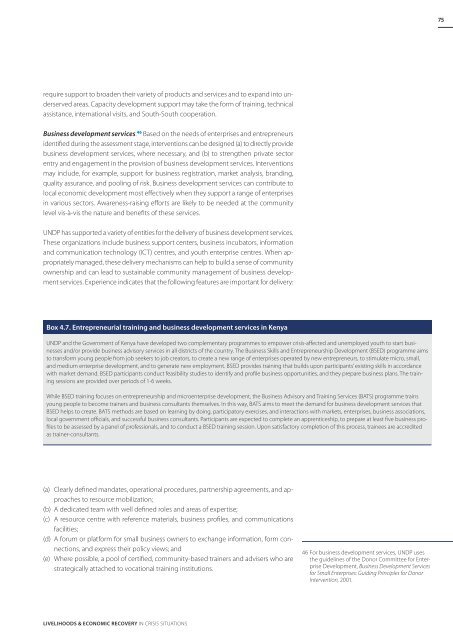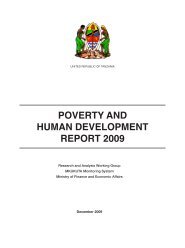Download PDF (4.08 MB) - ReliefWeb
Download PDF (4.08 MB) - ReliefWeb
Download PDF (4.08 MB) - ReliefWeb
Create successful ePaper yourself
Turn your PDF publications into a flip-book with our unique Google optimized e-Paper software.
75<br />
require support to broaden their variety of products and services and to expand into underserved<br />
areas. Capacity development support may take the form of training, technical<br />
assistance, international visits, and South-South cooperation.<br />
Business development services. 46 Based on the needs of enterprises and entrepreneurs<br />
identified during the assessment stage, interventions can be designed (a) to directly provide<br />
business development services, where necessary, and (b) to strengthen private sector<br />
entry and engagement in the provision of business development services. Interventions<br />
may include, for example, support for business registration, market analysis, branding,<br />
quality assurance, and pooling of risk. Business development services can contribute to<br />
local economic development most effectively when they support a range of enterprises<br />
in various sectors. Awareness-raising efforts are likely to be needed at the community<br />
level vis-à-vis the nature and benefits of these services.<br />
UNDP has supported a variety of entities for the delivery of business development services.<br />
These organizations include business support centers, business incubators, information<br />
and communication technology (ICT) centres, and youth enterprise centres. When appropriately<br />
managed, these delivery mechanisms can help to build a sense of community<br />
ownership and can lead to sustainable community management of business development<br />
services. Experience indicates that the following features are important for delivery:<br />
Box 4.7. Entrepreneurial training and business development services in Kenya<br />
UNDP and the Government of Kenya have developed two complementary programmes to empower crisis-affected and unemployed youth to start businesses<br />
and/or provide business advisory services in all districts of the country. The Business Skills and Entrepreneurship Development (BSED) programme aims<br />
to transform young people from job seekers to job creators, to create a new range of enterprises operated by new entrepreneurs, to stimulate micro, small,<br />
and medium enterprise development, and to generate new employment. BSED provides training that builds upon participants’ existing skills in accordance<br />
with market demand. BSED participants conduct feasibility studies to identify and profile business opportunities, and they prepare business plans. The training<br />
sessions are provided over periods of 1-6 weeks.<br />
While BSED training focuses on entrepreneurship and microenterprise development, the Business Advisory and Training Services (BATS) programme trains<br />
young people to become trainers and business consultants themselves. In this way, BATS aims to meet the demand for business development services that<br />
BSED helps to create. BATS methods are based on learning by doing, participatory exercises, and interactions with markets, enterprises, business associations,<br />
local government officials, and successful business consultants. Participants are expected to complete an apprenticeship, to prepare at least five business profiles<br />
to be assessed by a panel of professionals, and to conduct a BSED training session. Upon satisfactory completion of this process, trainees are accredited<br />
as trainer-consultants.<br />
(a) Clearly defined mandates, operational procedures, partnership agreements, and approaches<br />
to resource mobilization;<br />
(b) A dedicated team with well defined roles and areas of expertise;<br />
(c) A resource centre with reference materials, business profiles, and communications<br />
facilities;<br />
(d) A forum or platform for small business owners to exchange information, form connections,<br />
and express their policy views; and<br />
(e) Where possible, a pool of certified, community-based trainers and advisers who are<br />
strategically attached to vocational training institutions.<br />
46 For business development services, UNDP uses<br />
the guidelines of the Donor Committee for Enterprise<br />
Development, Business Development Services<br />
for Small Enterprises: Guiding Principles for Donor<br />
Intervention, 2001.<br />
Livelihoods & Economic Recovery in Crisis Situations





